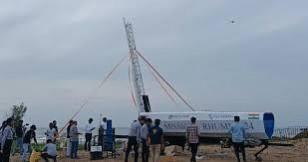
India's space sector witnessed a significant milestone with the successful launch of the country's first reusable hybrid rocket, 'RHUMI-1'. The launch was executed by Tamil Nadu -based startup Space Zone, in collaboration with the Martin Group, on August 24, 2024. The event took place at the TTDC Ground in Thiruvidandhai, ECR, Chennai, utilizing a mobile launcher. This achievement underscores India's growing prowess in the development of advanced space technologies.
The payload of the RHUMI-1 rocket comprised 3 Cube satellites and 50 PICO satellites. These satellites are designed to gather data on global warming and climate change, a pressing global issue. The data collected will provide valuable insights into climate patterns, environmental changes, and the impact of human activities on the Earth's atmosphere. This information will be instrumental in informing policies, driving scientific research, and supporting the development of strategies to mitigate climate change.
The RHUMI-1 rocket is equipped with a generic-fuel-based hybrid motor and an electrically triggered parachute deployer. This makes the rocket 100% pyrotechnic-free and 0% TNT, enhancing safety and reducing environmental impact.

The design of the RHUMI-1 rocket includes an adjustable launch angle, which can be fine-tuned from 0 to 120 degrees. This feature contributes to mission flexibility and efficiency, enabling the rocket to be launched in various directions based on mission requirements.
One of the most notable features of the RHUMI-1 rocket is its reusability. The ability to reuse the most expensive parts of the rocket can significantly lower the cost of space launches, making space access more affordable. This cost reduction can foster more frequent and diverse space missions, including satellite deployments, scientific research, and potentially even space tourism.
For commercial ventures, it opens up new opportunities for businesses to launch their payloads into space at reduced rates, spurring innovation and competition in the sector. The reusability of the RHUMI-1 rocket aligns with the global trend towards sustainable space practices. By minimizing debris and reducing the overall environmental footprint of space activities, the rocket contributes to the sustainability of space exploration.

The launch of the RHUMI-1 rocket was led by Dr. Mylswamy Annadurai, known as The Moon Man of India, who previously served as the Director of the ISRO Satellite Centre (ISAC). He was joined by Megalingam as the Mission Director. Dr. Annadurai's involvement in the mission underscores the significant expertise and experience that India has in the field of space exploration.
The successful launch of RHUMI-1 is a testament to India's growing capabilities in the space sector. It follows the launch of India's first hybrid rocket from the Atomic Research Centre in Kalpakkam in Tamil Nadu by Space Zone India in February 2023. The company has developed various rockets like RHUMI-1, RHUMI-2, and RHUMI-3, each tailored for altitudes ranging from 1 km to 500 km. The company also designed and developed its own ground-supporting equipment for rocket launches, creating portable launch systems that can easily be moved from one location to another without the need for large transportation. This innovation further demonstrates the company's commitment to advancing India's space capabilities.
The launch of RHUMI-1 marks a significant milestone in India's space exploration journey. It demonstrates the country's growing capabilities in developing advanced space technologies and its commitment to addressing global issues like climate change. As India continues to make strides in the space sector, it is poised to play an increasingly important role in global space exploration and research. This achievement is a testament to the country's dedication to innovation and sustainability in space exploration, setting a precedent for future missions and advancements in the field.














